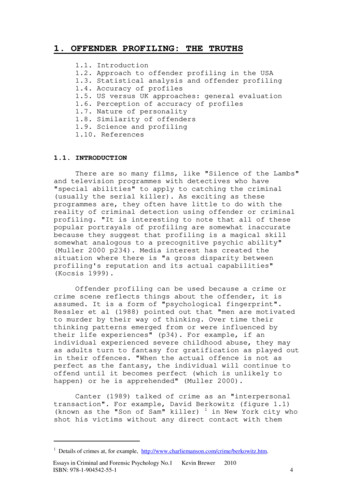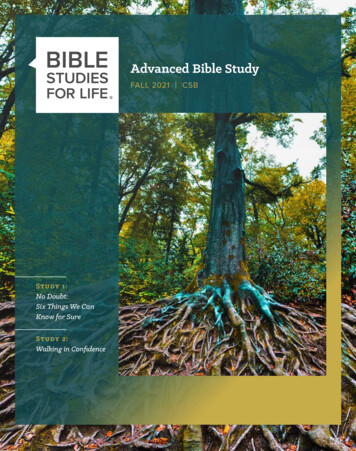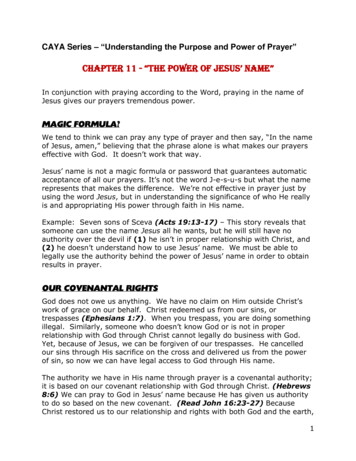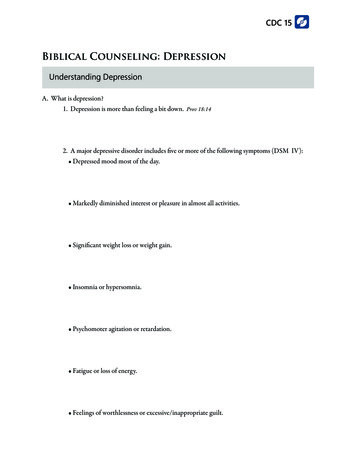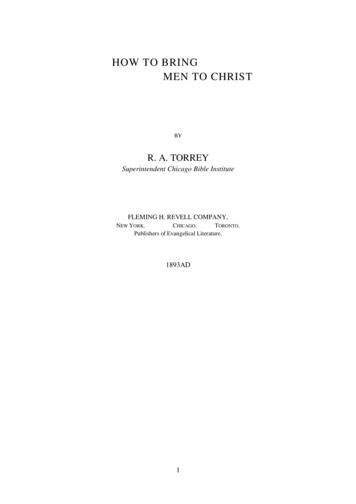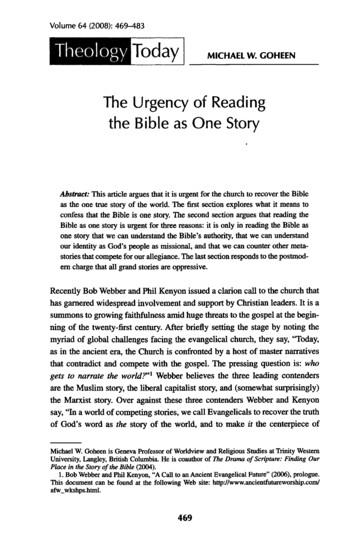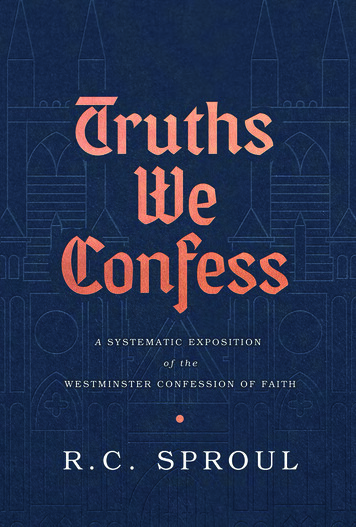
Transcription
T r ut hs We Confess
A S Y S T EM AT IC E X P O SI T IONof th eW E S T M I NS T ER CON F E S SION OF FA I T HRevised EditionR .C. Spr ou l
Truths We Confess: A Systematic Exposition of the Westminster Confession of Faith;Revised Edition 2019 by R.C. SproulPublished by Reformation Trust Publishinga division of Ligonier Ministries421 Ligonier Court, Sanford, FL 32771Ligonier.orgReformationTrust.comPrinted in ChinaRR Donnelley0000819First edition978-1-64289-162-1 (Hardcover)978-1-64289-163-8 (ePub)978-1-64289-164-5 (Kindle)All rights reserved. No part of this publication may be reproduced, stored ina retrieval system, or transmitted in any form or by any means—electronic,mechanical, photocopy, recording, or otherwise—without the prior writtenpermission of the publisher, Reformation Trust Publishing. The only exception isbrief quotations in published reviews.Cover design: Ligonier CreativeInterior design and typeset: Katherine Lloyd, The DESKUnless otherwise noted, Scripture quotations are from the ESV Bible (The HolyBible, English Standard Version ), copyright 2001 by Crossway, a publishingministry of Good News Publishers. Used by permission. All rights reserved.Scripture quotations marked KJV are from the King James Version. Public domain.The Westminster Confession of Faith, Westminster Shorter Catechism, andWestminster Larger Catechism are from The Confession of Faith and Catechisms: TheWestminster Confession of Faith and Catechisms as Adopted by the Orthodox PresbyterianChurch; with Proof Texts (Willow Grove, Pa.: Committee on Christian Education ofthe Orthodox Presbyterian Church, 2005). Used by permission.Library of Congress Cataloging-in-Publication DataNames: Sproul, R. C. (Robert Charles), 1939-2017, author.Title: Truths we confess : a systematic exposition of the Westminster Confessionof faith / by R.C. Sproul.Description: Revised edition. Orlando : Reformation Trust, 2019. Includesindex.Identifiers: LCCN 2018055747 ISBN 9781642891621 (hardcover) ISBN9781642891645 (kindle) ISBN 9781642891638 (e-Pub)Subjects: LCSH: Westminster Confession of Faith.Classification: LCC BX9183.W473 S67 2019 DDC 238/.5--dc23
CONTENTSForeword by Sinclair B. Ferguson. . . . . . . . . . . . . . . . . . . . . . . . . . viiPreface. . . . . . . . . . . . . . . . . . . . . . . . . . . . . . . . . . . . . . . . . . . . . . . . . . 11Of the Holy Scripture. . . . . . . . . . . . . . . . . . . . . . . . . . . . . . . . . . . . . 32Of God, and of the Holy Trinity. . . . . . . . . . . . . . . . . . . . . . . . . . . . 313Of God’s Eternal Decree . . . . . . . . . . . . . . . . . . . . . . . . . . . . . . . . . 694Of Creation . . . . . . . . . . . . . . . . . . . . . . . . . . . . . . . . . . . . . . . . . . . . 995Of Providence . . . . . . . . . . . . . . . . . . . . . . . . . . . . . . . . . . . . . . . . . 1226Of the Fall of Man, of Sin, and of the Punishment Thereof. . . . 1507Of God’s Covenant with Man. . . . . . . . . . . . . . . . . . . . . . . . . . . . . 1718Of Christ the Mediator. . . . . . . . . . . . . . . . . . . . . . . . . . . . . . . . . . . 1899Of Free Will. . . . . . . . . . . . . . . . . . . . . . . . . . . . . . . . . . . . . . . . . . . . 23110 Of Effectual Calling. . . . . . . . . . . . . . . . . . . . . . . . . . . . . . . . . . . . 23911 Of Justification . . . . . . . . . . . . . . . . . . . . . . . . . . . . . . . . . . . . . . . . 25612 Of Adoption. . . . . . . . . . . . . . . . . . . . . . . . . . . . . . . . . . . . . . . . . . . 28213 Of Sanctification. . . . . . . . . . . . . . . . . . . . . . . . . . . . . . . . . . . . . . . 28914 Of Saving Faith. . . . . . . . . . . . . . . . . . . . . . . . . . . . . . . . . . . . . . . . . 31515 Of Repentance unto Life . . . . . . . . . . . . . . . . . . . . . . . . . . . . . . . . . 33216 Of Good Works. . . . . . . . . . . . . . . . . . . . . . . . . . . . . . . . . . . . . . . . 35417 Of the Perseverance of the Saints . . . . . . . . . . . . . . . . . . . . . . . . . 37718 Of the Assurance of Grace and Salvation. . . . . . . . . . . . . . . . . . . . 39119 Of the Law of God . . . . . . . . . . . . . . . . . . . . . . . . . . . . . . . . . . . . . . 41120 Of Christian Liberty, and Liberty of Conscience . . . . . . . . . . . . 435
21 Of Religious Worship, and the Sabbath Day. . . . . . . . . . . . . . . . . 45922 Of Lawful Oaths and Vows. . . . . . . . . . . . . . . . . . . . . . . . . . . . . . 49223 Of the Civil Magistrate. . . . . . . . . . . . . . . . . . . . . . . . . . . . . . . . . . 50424 Of Marriage and Divorce. . . . . . . . . . . . . . . . . . . . . . . . . . . . . . . . . 52525 Of the Church . . . . . . . . . . . . . . . . . . . . . . . . . . . . . . . . . . . . . . . . . . 53726 Of the Communion of Saints . . . . . . . . . . . . . . . . . . . . . . . . . . . . . 55227 Of the Sacraments. . . . . . . . . . . . . . . . . . . . . . . . . . . . . . . . . . . . . . 56428 Of Baptism. . . . . . . . . . . . . . . . . . . . . . . . . . . . . . . . . . . . . . . . . . . . 59029 Of the Lord’s Supper. . . . . . . . . . . . . . . . . . . . . . . . . . . . . . . . . . . . 60930 Of Church Censures. . . . . . . . . . . . . . . . . . . . . . . . . . . . . . . . . . . . 63031 Of Synods and Councils. . . . . . . . . . . . . . . . . . . . . . . . . . . . . . . . . . 63532 Of the State of Men after Death, and of the Resurrectionof the Dead. . . . . . . . . . . . . . . . . . . . . . . . . . . . . . . . . . . . . . . . . . . . 64233 Of the Last Judgment. . . . . . . . . . . . . . . . . . . . . . . . . . . . . . . . . . . . 653Appendix 1 The Westminster Larger Catechism. . . . . . . . . . . . . . . . 663Appendix 2 The Westminster Shorter Catechism . . . . . . . . . . . . . . . 707Scripture Index. . . . . . . . . . . . . . . . . . . . . . . . . . . . . . . . . . . . . . . . . . . . . . 721Subject Index. . . . . . . . . . . . . . . . . . . . . . . . . . . . . . . . . . . . . . . . . . . . . . . . 731About the Author. . . . . . . . . . . . . . . . . . . . . . . . . . . . . . . . . . . . . . . . . . . . . 751
FOREWORDIt is a privilege indeed to sound a fanfare for Dr. R.C. Sproul’s Truths WeConfess. Although it is a large volume written by a learned theologian,and although it expounds a document that is now almost four hundredyears old—in the words of the angel, “Fear not!” For here you will find“good news of great joy . . . for all the people.” In these pages you willfind a treasure trove of rich biblical instruction written in a style that is asaccessible as it is pastoral.There is a simple reason for this—it was written by R.C. Sproul.Some four decades ago, a friend, recently returned from the UnitedStates, asked me if I had ever heard of R.C. Sproul, and he immediatelyadded, “He is said to be the greatest communicator of Reformed theologyin the world.” You do not easily forget a statement like that.Not long afterward, on first meeting and hearing R.C., and thenduring the decades that followed, I was frequently to experience the keywords in my friend’s simple statement: “theology,” “Reformed,” “communicator.” All three were present in R.C.’s life and ministry to a very highdegree and in an unusual unity.Some individuals are marked by one or perhaps two of these characteristics; to be marked by all three is rare. But R.C.’s passion for the HolyOne was expressed in his whole-souled commitment to and his remarkableability to communicate the truth, power, and life-transforming wisdom ofthe theology that the Reformers and Puritans had mined from the pages ofScripture. He had sat at the feet of the master theologians for long hoursand learned from them. But even more important than what he learnedfrom Martin Luther, John Calvin, and Jonathan Edwards was his ownencounter with the God of the Bible, who was their God, too. So, theologywas never an armchair hobby for him. Instead, it was an essential ingredientin the flatten-you-on-your-face, life-changing, personal knowledge of theLord who had revealed Himself to Moses and Isaiah, to Daniel and John.vii
viii TRUTHS WE CONFESSIn this sense, R.C. Sproul would not have been out of place in thegathering of ministers and others who assembled in Westminster Abbeyin London in the early summer of 1643 in order to produce materialsthat would bring a greater sense of unity and cohesion to the Reformedchurches in Europe. They began by revising the Church of England’sThirty-Nine Articles. They ended by producing a quite different series ofdocuments altogether: two catechisms (which are conveniently printedas appendices to this volume), directories for church government andpublic worship, and their pièce de résistance, the Westminster Confessionof Faith.I rather suspect R.C. would have loved to have been part of the hardthinking, the vigorous debating, and the creating of bonds of fellowshipafter defending one’s theological convictions that marked this several-years-long gathering. But more than that—as the labor that lies behindthis volume indicates—he loved the product of their hard work. For thesebecame for him, and for the ministry (Ligonier) and the church (SaintAndrew’s Chapel) of which he was founder, the very stuff of life and ministry. Whether he was in the classroom as a professor of theology, in thepulpit as pastor of a large church, at conferences for ministers and laypeople, in front of the camera and behind the microphone, or writing booksand creating a massive library of biblical and theological instruction, theWestminster Confession was the anatomy of everything he preached andtaught. For that reason, few things will do you more good or set you ona safer path than to sit now at R.C.’s feet and read through his expositionof the great doctrines of the Christian faith.I use the phrase “sit at his feet” deliberately, because you will soonrealize that this is exactly what you feel you are doing. Indeed, if you everhad the privilege of hearing R.C. speak, I suspect that you, like me, willhear his voice virtually reading his own book to you. One of its characteristics is the sense it gives of having been written for just one personalone—for you. It may well be the next best thing to sitting on your ownwith R.C. and listening to him talk to you about the great doctrines ofthe Christian faith.Truths We Confess is not an academic, technical discussion of anancient document. Such works have their place and value. However, the
FOREWORD ixWestminster Confession of Faith was written not to be dissected by academics but to guide the church and to instruct Christians and help themgrasp the structure of the gospel. It does for us what, sadly, is no longerdone as a matter of course either in the church or in the educational system:it teaches us first principles, and it shows us how to think through everything in light of them. And the inclusion here of the two catechisms helpsus see how these first principles are to be worked out in the context of aworld that throws up all kinds of challenges to the Christian. Insofar as thatis true, this is a book for every Christian home and family and one that willbe especially valuable for younger Christians setting out on the way.Two anecdotes will, I hope, underscore the worthwhileness of thecommitment of time and energy you are making as you begin to readthrough these pages.After a weekend away enjoyed by the young people in our church, Iheard the following. On one of the evenings, when all the activities of theday were over, the youngsters were “chilling out” with one or two of themothers who had accompanied them. They began to ask question afterquestion—worldview questions, ethical questions, theological questions,Bible questions. One of the mothers patiently, succinctly, and impressively answered them all. Later, the second mother said to her: “That wasamazing what you did there with the youngsters tonight! How did youknow all these answers?” The first mother simply smiled and said, “Oh,they’re all basically in the Shorter Catechism.” She had grasped the doctrinal first principles and had learned to think about everything in lightof them.I feel confident that if you sit at R.C.’s feet in Truths We Confess, youwill discover that you, too, understand the gospel more fully and arebetter equipped to live an intelligent and wise Christian life. Not onlyso, but whether you are a parent, a student, a neighbor, or a colleague atwork, you will be all the more able to “make a defense to anyone who asksyou for a reason for the hope that is in you” and to “do it with gentlenessand respect” (1 Peter 3:15).The second story may well make you smile—at least, it has that effecton me! Dr. Derek Thomas and I have enjoyed the privilege not only ofbeing Ligonier Teaching Fellows together but of serving as ministers in
x TRUTHS WE CONFESSthe same congregation. One weekend, R.C. honored us by coming toteach and preach in our church. At the Sunday morning services, hepreached on the person of Christ. As the members of the congregationleft through the various exit doors, one of them greeted Dr. Thomaswith the words, “About time somebody was teaching some theology inthis church!”The comment might have hurt—after all, we were both professorsof systematic theology as well as pastors in the congregation! What hadwe been doing? But instead, we laughed together. Truth to tell, we hadbeen teaching doctrine to the congregation—but apparently, we did nothave the R.C. touch. In the world of popular communication of thegreat truths of the faith, he was the undoubted master. Thousands ofpeople around the world—indeed, hundreds of thousands—have beenintroduced to thoughtful Christianity through him and have come toappreciate the Godness of God the Holy One through his ministry.As you will discover in these pages, like all systematic theologians,R.C. loved little Latin phrases. Older writers used to distinguish betweenwhat they called theologia viatorum and theologia gloriae—the theology weunderstand as pilgrims on the way, and the theology we will understandonly when we are in glory. R.C. went to be with the Lord on December14, 2017, and now enjoys the theologia gloriae. But thankfully, he has leftbehind for our benefit and blessing this marvelous compendium of thetheologia viatorum. And since we are still pilgrims on the way, it is exactlywhat we need. So, in words once famously heard by Augustine of Hippo,a theologian R.C. ranked among the greatest, Tolle lege—Take up thisbook, and read it!—Dr. Sinclair B. FergusonLigonier Ministries Teaching FellowCarnoustie, Scotland
P R E FA C EFor centuries, the church of Jesus Christ has found it necessary toconfess its faith before the watching world. Confessions of our faithhave come in the forms of brief creedal statements and larger, more comprehensive confessional documents. From the early days of the Apostles’Creed—which includes the opening statement “I believe,” from the Latincredo—the church has shown its obedience to the command of our Lordnot only to believe in our hearts but also to profess with our lips what webelieve. Christianity is a religion with content. Its truths are central to thelife and practice of the church.It is necessary in every generation for the church to clarify its beliefsagainst constant attacks and distortions of her body of truth. Christianityis sometimes called a faith, the “Christian faith.” In using the term faith,what is in view is the body of truths that the church affirms and puts hertrust in and by which the content of Christianity is defined.One of the most important confessions of faith ever penned, particularly in the English-speaking world, is the Westminster Confession ofFaith. By the confession’s own statements, no confession written by uninspired authors is to be taken as having supreme authority over the believer.Confessions cannot bind the conscience in the manner that the Word ofGod can and does. At the same time, though human confessions andcreeds are penned by fallible people without the benefit of the inspirationof the Holy Spirit, the profound level of theological and biblical precisionmanifest in the Westminster Confession of Faith is awe-inspiring.The Westminster Confession is the most precise and accurate summary of the content of biblical Christianity ever set forth in a creedalform. Creeds such as the Belgic Confession, the Heidelberg Catechism,and the Scots Confession should be highly regarded, but no historic confession surpasses in eloquence, grandeur, and theological accuracy theWestminster Confession of Faith.1
2 TRUTHS WE CONFESSThough by no means a political document, the confession was forgedin the midst of political turmoil in England in the seventeenth century.England’s Reformation did not have the most auspicious beginning, perhaps sparked less by theological conviction and more by Henry VIII’sdesire for a male heir and thus his split with the Roman Catholic Churchover his freedom to divorce. From there, things only got worse, as a seriesof monarchs saw England flip from Protestant to Catholic and backagain. Eventually, this gave rise to an unhappy medium, which in turnsparked the rise of the Puritan movement. The Puritans were committedProtestants who wanted to see the church purged of any influence fromthe Roman Catholic Church.During the English Civil War, as King Charles I’s tenuous grip onthe English throne slipped, he called the Long Parliament, which inturn called the Westminster Assembly. Originally charged with revisingthe Thirty-Nine Articles, the confession of the Church of England, theassembly soon shifted focus to put together a whole new confession.The end result was a well-balanced consensus document. There wereheated debates on sundry issues, most notably church government. Therewas, however, a level of clarity and precision that the pastors and theologians who composed the document—known as divines—could bethankful for.This exposition of the Westminster Confession of Faith is not written in a technical, academic way but is designed to be accessible to thelay reader. It is my hope that as people study the articles set forth in thisconfession, they will come to a deeper understanding of and greater lovefor the doctrines of grace so ably set forth by the Westminster divines. Itis my prayer that the confession will drive us constantly to the Scripturesthemselves for the confirmation of what is hereby professed.
WCF1Of the HolyScripture1.Although the light of nature, and the works of creation and providencedo so far manifest the goodness, wisdom, and power of God, as to leavemen unexcusable; yet are they not sufficient to give that knowledgeof God, and of his will, which is necessary unto salvation. Therefore itpleased the Lord, at sundry times, and in divers manners, to reveal himself, and to declare that his will unto his church; and afterwards, for thebetter preserving and propagating of the truth, and for the more sureestablishment and comfort of the church against the corruption of theflesh, and the malice of Satan and of the world, to commit the samewholly unto writing: which maketh the Holy Scripture to be most necessary; those former ways of God’s revealing his will unto his people beingnow ceased.2.Under the name of Holy Scripture, or the Word of God written, are nowcontained all the books of the Old and New Testaments, which are these:Of the Old Testament:GenesisII msJonahJudgesProverbsMicah3
4 TRUTHS WE CONFESSRuthEcclesiastesNahumI SamuelThe Song of SongsHabakkukII SamuelIsaiahZephaniahI KingsJeremiahHaggaiII KingsLamentationsZechariahI ChroniclesEzekielMalachiOf the New Testament:The GospelsGalatiansThe Epistleaccording toEphesiansof JamesMatthewPhilippiansThe first andMarkColossianssecond EpistlesLukeThessalonians Iof PeterJohnThessalonians IIThe Acts of theApostlesPaul’s Epistlesto the RomansThe first, second,to Timothy Iand third Epistlesto Timothy IIof Johnto Titusto PhilemonCorinthians IThe Epistle toCorinthians IIthe HebrewsThe Epistleof JudeThe Revelationof JohnAll which are given by inspiration of God to be the rule of faith and life.3.The books commonly called Apocrypha, not being of divine inspiration,are no part of the canon of the Scripture, and therefore are of no authority in the church of God, nor to be any otherwise approved, or made useof, than other human writings.4.The authority of the Holy Scripture, for which it ought to be believed,and obeyed, dependeth not upon the testimony of any man, or church;but wholly upon God (who is truth itself) the author thereof: and therefore it is to be received, because it is the Word of God.5.We may be moved and induced by the testimony of the church to anhigh and reverent esteem of the Holy Scripture. And the heavenlinessof the matter, the efficacy of the doctrine, the majesty of the style, the
Of the Holy Scripture 5consent of all the parts, the scope of the whole (which is, to give all gloryto God), the full discovery it makes of the only way of man’s salvation,the many other incomparable excellencies, and the entire perfectionthereof, are arguments whereby it doth abundantly evidence itself to bethe Word of God: yet notwithstanding, our full persuasion and assuranceof the infallible truth and divine authority thereof, is from the inward workof the Holy Spirit bearing witness by and with the Word in our hearts.6.The whole counsel of God concerning all things necessary for his ownglory, man’s salvation, faith and life, is either expressly set down in Scripture, or by good and necessary consequence may be deduced fromScripture: unto which nothing at any time is to be added, whether bynew revelations of the Spirit, or traditions of men. Nevertheless, weacknowledge the inward illumination of the Spirit of God to be necessary for the saving understanding of such things as are revealed in theWord: and that there are some circumstances concerning the worshipof God, and government of the church, common to human actions andsocieties, which are to be ordered by the light of nature, and Christianprudence, according to the general rules of the Word, which are alwaysto be observed.7.All things in Scripture are not alike plain in themselves, nor alike clearunto all: yet those things which are necessary to be known, believed, andobserved for salvation, are so clearly propounded, and opened in someplace of Scripture or other, that not only the learned, but the unlearned,in a due use of the ordinary means, may attain unto a sufficient understanding of them.8.The Old Testament in Hebrew (which was the native language of thepeople of God of old), and the New Testament in Greek (which, at thetime of the writing of it, was most generally known to the nations), beingimmediately inspired by God, and, by his singular care and providence,kept pure in all ages, are therefore authentical; so as, in all controversiesof religion, the church is finally to appeal unto them. But, because theseoriginal tongues are not known to all the people of God, who have rightunto, and interest in the Scriptures, and are commanded, in the fearof God, to read and search them, therefore they are to be translatedinto the vulgar language of every nation unto which they come, that,
6 TRUTHS WE CONFESSthe Word of God dwelling plentifully in all, they may worship him in anacceptable manner; and, through patience and comfort of the Scriptures, may have hope.9.The infallible rule of interpretation of Scripture is the Scripture itself:and therefore, when there is a question about the true and full sense ofany Scripture (which is not manifold, but one), it must be searched andknown by other places that speak more clearly.10. The supreme judge by which all controversies of religion are to be determined, and all decrees of councils, opinions of ancient writers, doctrinesof men, and private spirits, are to be examined, and in whose sentencewe are to rest, can be no other but the Holy Spirit speaking in theScripture.The Westminster Confession of Faith is one of the most important Protestant confessions, for it gave substantial definition toReformed theology in the seventeenth century. It is often compared tosimilar confessions of faith, such as the Belgic Confession, the HeidelbergCatechism, the Scots Confession, and the Thirty-Nine Articles.There was an internal debate as to where to begin a study of Reformedtheology: with the doctrine of God or with the doctrine of Scripture. Itis significant that the Westminster divines began their confessional statement with sacred Scripture. They were concerned about two principles.One, which is at the very heart of Christianity, is the concept of divinerevelation. Christianity is a revealed religion, constructed not on thebasis of speculative philosophy but in response to what God Himself hasmade manifest. Second is the principle of sola Scriptura, developed by theReformers. It acknowledges that the final authority in all matters of theology and in all controversies of faith and life is not the decrees or traditionsof the church but sacred Scripture itself. The Westminster Confessionaffirms the central importance and sufficiency of Scripture—a Reformational concept.1. Although the light of nature, and the works of creation and providence do so far manifest the goodness, wisdom, and power ofGod, as to leave men unexcusable; yet are they not sufficient to
Of the Holy Scripture 7give that knowledge of God, and of his will, which is necessaryunto salvation. Therefore it pleased the Lord, at sundry times,and in divers manners, to reveal himself, and to declare that hiswill unto his church; and afterwards, for the better preserving andpropagating of the truth, and for the more sure establishmentand comfort of the church against the corruption of the flesh,and the malice of Satan and of the world, to commit the samewholly unto writing: which maketh the Holy Scripture to be mostnecessary; those former ways of God’s revealing his will unto hispeople being now ceased.The first sentence distinguishes between the divine revelation that is sufficient for salvation and the divine revelation that is not sufficient forsalvation. The light of nature refers to Paul’s teaching about general revelation (Rom. 1). Classic Reformed theology distinguishes between general(or natural) revelation and special revelation.God’s general revelation is His revelation of Himself principallythrough nature and also through history, through the ministry of Hisprovidence to His people, and through His works of creation. “The heavens declare the glory of God, and the sky above proclaims his handiwork”(Ps. 19:1). Paul teaches that all men, by nature, know something of theexistence, character, power, and deity of God, because God so clearlymanifests Himself in general revelation (Rom. 1:18–20).God’s general revelation can be either “immediate” or “mediate.”Immediate means “direct, without any medium or intervening agency.”Paul talks about God’s revealing His law inwardly through the humanheart, so that every person is born with a conscience (Rom. 2:14–15).God plants a sense of Himself immediately in the soul of His creatures.John Calvin calls this the sensus divinitatis, “the sense of the divine.” Asfallen creatures, we suppress the knowledge of right and wrong that Godplants within us. But try as we may, we can never extinguish it. It is stillpresent in the soul. That is immediate general revelation.Mediate general revelation has to do with the way in which God manifests Himself through creation itself. Nature points beyond itself to itsMaker and Creator. Paul speaks of mediate revelation when he says thatthe invisible things of God, even His eternal power and divine nature, are
8 TRUTHS WE CONFESSunderstood through the created order. That knowledge also is squelched,repressed, and unacknowledged by fallen creatures. The indictment ofthe whole human race is that while we know God by virtue of generalrevelation, we refuse to honor Him as God and are not grateful to Him(Rom. 1:20–21).It is no wonder that the Westminster divines wrestled over whether tobegin the confession with the doctrine of revelation or with the doctrineof God—the two are intimately tied together. God is not only a Godwho exists but also a God who speaks. Communication is essential to Hisbeing. This is why, in turn, natural revelation quickly turns to naturaltheology. God has revealed through nature not only His law, by placingthat law in our hearts, but also His nature. Natural theology encompasses all that is knowable about God apart from special revelation. Pauldescribes this as “his eternal power and divine nature” (Rom. 1:20). We
Sproul’s Truths We Confess. Although it is a large volume written by a learned theologian, and although it expounds a document that is now almost four hundred years old—in the words of the angel, “Fear not!” . or writing books and creating a massive library of biblical and theolo

